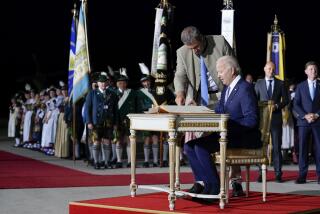Most-Favored Trading Status Due for Soviets
- Share via
WASHINGTON — After a year-long delay, the Bush Administration expects to reach final agreement on a new U.S.-Soviet trade pact--including most-favored-nation trading status for the Soviet Union--during President Bush’s summit with Soviet President Mikhail S. Gorbachev in Moscow next week.
A senior Administration official said the United States will waive its earlier insistence that the Soviets formally change their laws before Washington confers the most-favored trade status--enabling Bush to announce the accord during the summit in a gesture of support.
“We just need a commitment that they’ll fix the law,” the official said. “We don’t want any more delays.”
The decision would allow the Administration to send the trade agreement to the Senate for ratification, the final hurdle for Moscow’s longstanding bid for most-favored status. That would give the Soviet Union the same lower tariffs that Washington accords to most other U.S. trading partners.
Under most-favored status, the tariffs on Soviet exports to the United States would be slashed from an average of 34% to 6.7%. But the Soviet Union has little to export, so the main impact of the move is likely to be political.
Raymond Garthoff, a former State Department expert on the Soviet Union and now at the Brookings Institution here, said that most-favored status “will have a symbolic effect as a further step toward economic normalization and a sign that we are interested in moving forward.”
Agreement on the trade pact may be the only concrete advance in U.S.-Soviet economic ties during the two-day summit between Bush and Gorbachev, which is scheduled to begin a week from today.
Most of what the Administration is willing to do to help Gorbachev--and to bolster the more radical Soviet reformers--was already unveiled in London at the annual economic summit of the Western industrial democracies last week.
Bush is expected to make a formal announcement in Moscow of three U.S. programs to advise the Soviets on economic reform: in agricultural production and marketing; in energy, and in the conversion of the defense industry. U.S. officials have disclosed the plans informally.
But aides said that Bush does not feel any pressure to unveil any additional assistance during the Moscow summit, which will mark his first visit to the Soviet Union as President.
“There won’t be any big new unexpected list of programs,” a senior official said. “We’ve got to work on ways for them to absorb what they’ve already got. . . . We need to talk about what Gorbachev got out of the (London summit) and what he can do with it. I don’t think that he fully understood the opportunity he got there.”
In London, the seven industrial powers offered Gorbachev a six-point program of help for his economic reforms, centering on various kinds of advice and technical assistance rather than direct financial aid.
The next step, the senior official said, is to persuade Gorbachev to take up the offer of “special association” with the International Monetary Fund--agreeing, in effect, to make the Western-run IMF a full partner in his economic reforms.
“He needs to put together a reform program that will convince the IMF,” the official said. “At that point, you can think about a convertible ruble, a stabilization fund, other forms of aid--but not until the program is there.”
The United States and the Soviet Union have been talking about most-favored-nation status since 1989 and agreed to the text of a trade agreement last year. But the path has been strewn with obstacles.
First, the Soviet Parliament dawdled over final passage of a new, freer emigration law, which the United States required under 1974 legislation. Once the emigration law was passed, an unexpected hitch arose over a newly passed Soviet copyright law, which failed to meet U.S. standards.
But U.S. trade negotiators have reported to the White House that the Soviet government has agreed to amend the law--and the Administration is willing to move ahead on the basis of that assurance, without waiting for formal action.
“They were passing laws willy-nilly,” the official explained of the Soviet Parliament. “It isn’t clear that they knew what the implications were when they passed it.”
More to Read
Get the L.A. Times Politics newsletter
Deeply reported insights into legislation, politics and policy from Sacramento, Washington and beyond. In your inbox twice per week.
You may occasionally receive promotional content from the Los Angeles Times.











